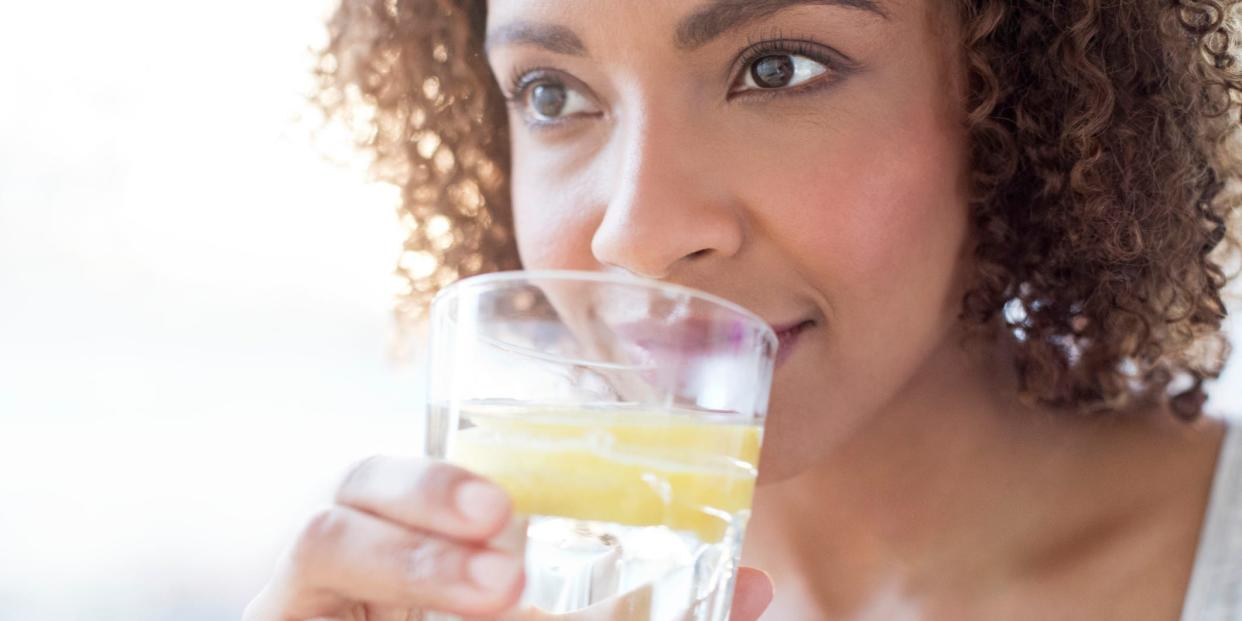The 3 best natural home remedies for kidney stones

Science Photo Library/Getty Images
The best home remedies for kidney stones include drinking water, lemon juice, and pomegranate juice.
Research has found that these fluids can help break up the minerals and salts that clump together in your urine to form kidney stones.
This article was medically reviewed by S. Adam Ramin, MD, urologic surgeon and medical director of Urology Cancer Specialists in Los Angeles, California.
Kidney stones are hard deposits of compounds typically found in urine that clump together in your urinary tract. They affect about 1 in 11 Americans.
Typically, kidney stones are treated with dietary changes or medication. However, there are also home remedies that can help prevent and even treat kidney stones, such as the following beverages:
1. Drink water
If you have kidney stones, or are prone to get them, the first thing your doctor will likely tell you is to make sure you drink plenty of water.
Kidney stones form when certain minerals and salts in your urine clump together. Drinking plenty of water helps keep your urine dilute and flushes out your kidneys and urinary tract, so the minerals and salts don't build up and turn into stones. No matter what kind of kidney stone you have, drinking plenty of water will help.
If you have kidney stones, doctors recommend drinking about three quarts of water a day, says Kiersten Craig, MD, a urologist at Weil Cornell Medicine. If you are active or live in hot temperatures, you may want to drink even more than that.
2. Have lemon juice
Lemon juice can help prevent kidney stones, especially calcium stones — the most common type of kidney stone — because it contains citrate.
Calcium and oxalate have an affinity for each other, meaning they will stick together, forming calcium oxalate. When this happens in the urinary tract, it leads to kidney stones. Citrate essentially "coats" the deposits so that more calcium and oxalate can't clump on, says Craig.
A small 2017 study published in the Journal of Urology found that drinking two liters of water with four ounces of lemon juice a day decreased the rate of stone formation from 1.00 to .13 per person per year.
3. Try pomegranate juice
Pomegranate is often used to treat conditions like ulcers and diarrhea, and it may also be beneficial in treating kidney stones because of its antioxidant properties.
Antioxidants help prevent and reduce oxidative stress, which is linked to kidney stone formation. Oxidative stress occurs when there are too many free radicals, or molecules with an uneven number of electrons, which makes them very reactive. When antioxidants come in contact with free radicals, they give the free radical an electron, stabilizing it and reducing oxidative stress.
Pomegranate juice has 2 to 3 times the antioxidant capacity of green tea or red wine, and a 2011 analysis of data from the 1980s and 90s found that adults with a self-reported history of kidney stones also had between 8% and 11% lower levels of antioxidants in their blood serum. This suggests that antioxidants may help play a role in stone formation.
A 2014 study published in the journal Urolithiasis had patients with recurrent kidney stones take 1,000 mg of pomegranate extract for 90 days. The researchers then analyzed the participants' urine and found that taking the extract led to decrease in calcium oxalate concentration in the urine. They also found a decrease in oxidative stress.
According to a 2008 article in the journal Alternative Medicine Review, studies show pomegranate juice has no toxic effects in humans. However, it can interact with certain medicines, like the blood thinner warfarin or angiotensin-converting enzyme (ACE) inhibitors, so make sure you talk to your doctor before taking it.
You can buy pomegranate juice at a grocery store, either as 100% juice, which you can drink as is, or pomegranate juice concentrate, which you will want to dilute.
When to see a doctor
If you think you have kidney stones, you'll want to go to your doctor to discuss the best course of treatment for you. Most of the time, however, kidney stones don't require medical intervention, and you can treat it effectively with these home remedies and other dietary changes.
You should also seek medical attention if you experience any of the following symptoms:
Nausea or vomiting
Fever
Blood in your urine
Difficulty passing urine
These may be signs that you have further kidney damage or health complications, and will likely require medical intervention to effectively treat.
Takeaways
These home remedies may help you treat or prevent kidney stones. But overall, it's important to visit with a doctor for more information on how to get rid of your kidney stones.
"After passing a kidney stone, save the stone and give it to a urologist for stone analysis," Craig says. "This will tell you the type of stones and give a specific guide to diet changes that will decrease further stone formation."
For more information, read about how to prevent kidney stones from occurring.
Related stories from Health Reference:
Read the original article on Insider

